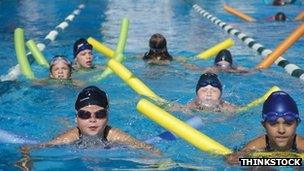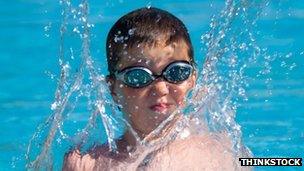Primary schools 'failing to honour swimming obligations'
- Published

Swimming is a compulsory part of the national curriculum
A third of children in England cannot swim by the time they leave primary school, according to research from the Amateur Swimming Association (ASA).
The research suggests many non-swimmers have never had a school swimming lesson despite its being part of the national curriculum for seven-to-11-year-olds.
The ASA says swimming is the only curriculum subject that saves lives.
The Department for Education said schools must provide lessons and pupils must be taught to swim 25m unaided.
The researchers for ASA and cereal company Kellogg's, sponsors of the association's swimming awards, set out to find out what proportion of 11-year-olds achieved the national curriculum target of being able to swim 25m by the time they left primary school.
Only 35 local authorities in England - around a quarter of those contacted - gave full responses to Freedom of Information requests from the team, relating to their records for 2011.
Their answers revealed that two-thirds of children achieved the target, meaning one-third did not.
The researchers calculate that this means around 200,000 children leave primary school each year unable to swim properly.
Accidental death
The survey responses also suggested that of the children who could not swim, 39% had never been offered school swimming lessons.
The report, Save School Swimming, Save Lives, calls for every child in the UK to have the opportunity to learn to swim in primary school.
It quotes figures from the National Water Safety Forum which show that more than 400 people drown each year in the UK and that drowning is the third most common cause of accidental death in children.
The report states: "Each child should be safe in and around water, and a key element of this is being able to swim a minimum of 25m unaided.
"We call on central and local government to show their commitment to school swimming by reiterating this expectation to schools."
It also calls on primary head teachers to make swimming a priority in their school budgets and wants Ofsted to monitor the inclusion and delivery of swimming lessons.
ASA is also offering help and advice to encourage schools with their own pools to keep them open.

The research found a quarter of children had private swimming lessons
David Sparkes, of the ASA, said: "Swimming is the only subject on the national curriculum that can save your life."
Struggling to swim
The report points to a direct correlation between swimming ability and school lessons. For example, all children in South Northamptonshire, where 91% of 11-year-olds achieve the government target, get swimming lessons at school.
The report also includes a survey of more than 1,000 parents which showed almost all (98%) believed every child should be able to swim by the end of primary school but only 40% thought their children would be able to swim to safety if they got into danger in the water.
Around a quarter (24%) of parents paid for private swimming lessons but another 24% said they could not afford either lessons or pool admission.
David Walker, of the Royal Society for the Prevention of Accidents (RoSPA) said: "We are concerned to see that so many children are struggling to swim at an acceptable standard.
"RoSPA believes that good awareness of water safety and the ability to swim are essential skills."
A spokeswoman for the DfE said: "Swimming is a compulsory part of the national curriculum, and all primary schools have a duty to provide swimming lessons for their pupils.
"By the end of primary school, pupils must be taught to swim 25m unaided using recognised strokes on their front and back and use a range of personal survival skills.
"We would expect that schools would take the needs of their children into account in making all decisions."
Helen Bilton, of University of Reading's Institute of Education, called for the government to help with the upkeep of school pools.
"Schools are getting the blame but really they need more support from government," she said. "PE is not sufficiently valued as a subject for the resources to be spent on it.
"At the end of the day, swimming can't be a priority if English and Maths Sats results are what makes a school survive an Ofsted report or not."
- Published7 October 2011
- Published12 February 2012
- Published17 May 2012